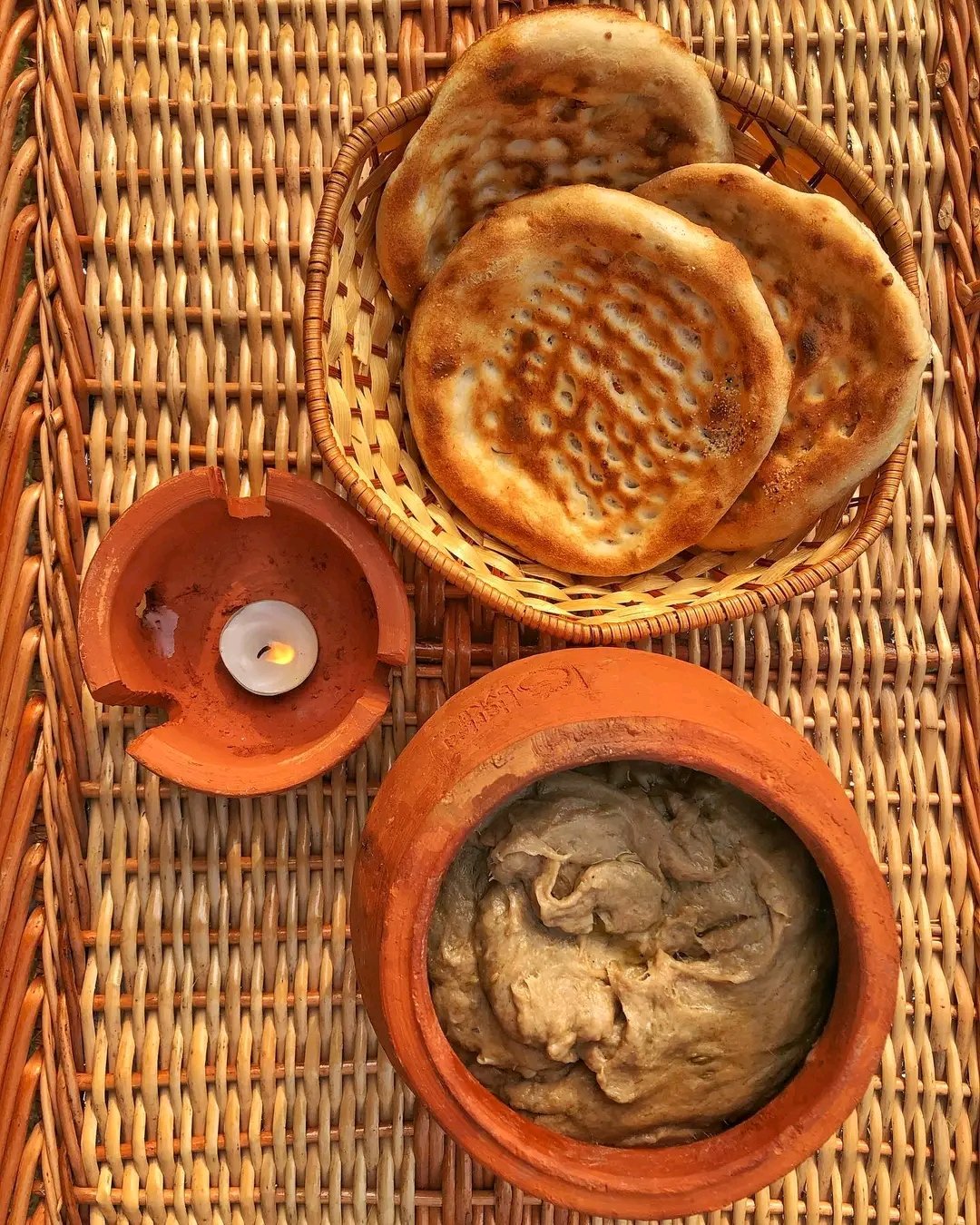Aubaid Akhoon
Kashmiri Harisa, a beloved winter delight, shares more than just its name with the famous South Iranian Harisa. This hearty dish, known for its thick pottage made of bruised wheat, meat, butter, cinnamon, and aromatic herbs, has a cultural and historical connection that transcends borders.
In South Iran, Harisa is still a celebrated mutton recipe today. It’s a culinary masterpiece where bruised wheat is meticulously boiled to the perfect consistency, and then enriched with meat, butter, cinnamon, and fragrant herbs. The artisans behind this dish are known as “Harisa-Paz” or “Harisa-Gar” in Persian-speaking regions.
The intriguing connection between Kashmiri Harisa and its South Iranian counterpart can be traced back to the historical and cultural exchanges facilitated by the Silk Road, which passed through Leh, connecting Persia with Kashmir. Persian-speaking traders, travelers, and rulers undoubtedly played a role in introducing this rich culinary tradition to the Kashmiri people, as they did with many other cultural and culinary customs.
The first historical mention of Harisa can be found in Abu Muhammad Ibn Sayyar’s Arabic cookbook, Kitabul Tabik, Book of Cooking, dating back to the 10th century during the Alsafvid Caliphate of Islam. This dish, with variations in texture, ingredients, and taste, has found its place in the culinary traditions of the Middle East, South Asia, and other Muslim countries, often with slightly different names.
The rich tapestry of Kashmiri cuisine is interwoven with the centuries-old tradition of savoring Harissa, a hearty winter breakfast dish that has stood the test of time. As the vibrant hues of autumn paint the landscapes of Kashmir, the allure of Harissa awakens, offering not just nourishment for the body but solace for the spirit.
Unlike the fiery pepper pastes of North Africa that share its name, Kashmiri Harissa is a distinct culinary gem, primarily savored in the heart of Srinagar. The city’s historical downtown areas come alive with scores of Harissa establishments, opening their doors around October and continuing to serve this winter delicacy until March. During the harsh winter months, Harissa assumes the role of an essential morning repast for the people of the valley.
The journey of Harissa in Kashmir can be traced back to the 14th century, attributed to the influence of Mirza Hyder Duglat of Yarkand. However, some speculate that its roots extend even further to Central Asia, leaving an indelible mark on Kashmir’s customs, rituals, beliefs, and gastronomic culture. It wasn’t until the Afghan rule of Kashmir that Harissa took its present form and became an indispensable facet of Kashmiri cuisine.
In the heart of Kashmir, Harissa is a dish that embodies tradition and craftsmanship. Traditionally prepared during the frigid winter, locally referred to as “chillai kalan,” it features mutton and rice flour, often accompanied by Kashmiri bread known as “girda.” The meticulous preparation process begins in the afternoon with the careful selection and chopping of the meat. Around 10 pm, the finely chopped lamb embarks on a slow-cooking journey in a colossal earthen pot.
Simultaneously, a porridge of rice, ideally made from short-grained Kashmiri rice, is meticulously crafted. The cooked rice gracefully melds with the meat, infused with a symphony of spices including fennel seeds, cinnamon, green and black cardamom, cloves, crisply fried Kashmiri shallots, and salt.
Around 1:00 am, the narrow-necked earthen pot is gently sealed, allowing the flavors to meld in harmony. The artisans behind Harissa then take a well-deserved break. As the clock strikes 4 :30 am, the skeletal remains of bones, stripped bare of their meat, are carefully removed. The mixture is either retained in a spacious earthen pot or transferred to a large copper vessel, where it undergoes relentless pounding until it transforms into a sumptuous paste. The climax of the process involves the lavish addition of smoking-hot mustard oil, meticulously kneaded into the blend with a lengthy wooden masher until the desired consistency is achieved. This gastronomic masterpiece is then portioned onto plates, garnished with seasoned mustard oil, and served with the indigenous bread, girda.
A serving of Harissa in Kashmir is not complete without a mutton kebab and “methi,” a finely minced amalgamation of a sheep’s entrails simmered in ghee and fenugreek. Those fortunate enough to secure their portion by 10 am at one of the ancient city establishments may even savor the golden-brown crust “phuher,” “Harisa Phur in Kashmiri” gently scraped from the pot’s base, a cherished delicacy among both the young and the old.
While modern cafes in the vicinity have also embraced the allure of Harissa, seamlessly incorporating it into their menus, the authentic charm of partaking in this culinary delight amidst the cobbled streets of downtown Srinagar on a brisk winter morning remains unparalleled.
Harissa in Kashmir transcends the realm of mere sustenance; it emerges as an indelible fragment of history and culture, instilling warmth and camaraderie in the hearts of the valley’s denizens. Its preparation stands as an art form, a labor of love passed down through generations. As the wintry chill envelops Kashmir, the redolent essence of Harissa drifts through the vibrant bazaars, serving as a poignant reminder of a time-honored tradition that has persevered through the ages.
The author is Sr. EDP Head in DD Target PMT Parraypora. He can be reached at [email protected]
Disclaimer: The views and opinions expressed in this article are the personal opinions of the author.




